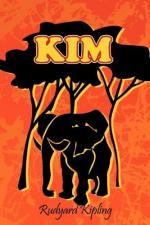The lama never raised his eyes. He did not note the money-lender on his goose-rumped pony, hastening along to collect the cruel interest; or the long-shouting, deep-voiced little mob -still in military formation — of native soldiers on leave, rejoicing to be rid of their breeches and puttees, and saying the most outrageous things to the most respectable women in sight. Even the seller of Ganges-water he did not see, and Kim expected that he would at least buy a bottle of that precious stuff. He looked steadily at the ground, and strode as steadily hour after hour, his soul busied elsewhere. But Kim was in the seventh heaven of joy. The Grand Trunk at this point was built on an embankment to guard against winter floods from the foothills, so that one walked, as it were, a little above the country, along a stately corridor, seeing all India spread out to left and right. It was beautiful to behold the many-yoked grain and cotton wagons crawling over the country roads: one could hear their axles, complaining a mile away, coming nearer, till with shouts and yells and bad words they climbed up the steep incline and plunged on to the hard main road, carter reviling carter. It was equally beautiful to watch the people, little clumps of red and blue and pink and white and saffron, turning aside to go to their own villages, dispersing and growing small by twos and threes across the level plain. Kim felt these things, though he could not give tongue to his feelings, and so contented himself with buying peeled sugar-cane and spitting the pith generously about his path. From time to time the lama took snuff, and at last Kim could endure the silence no longer.




